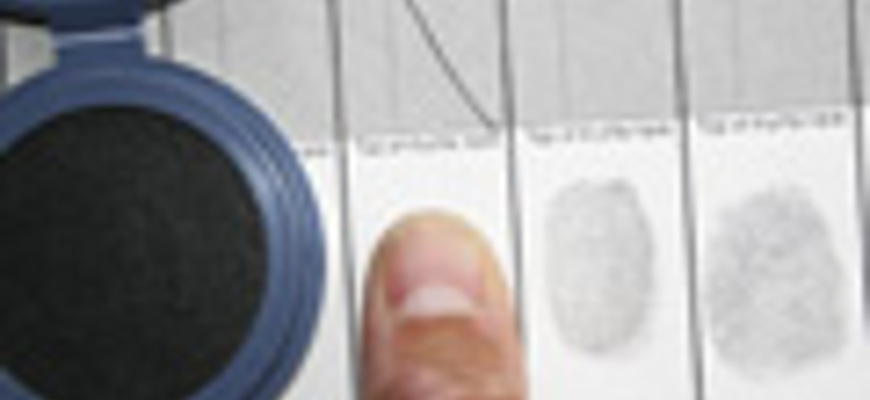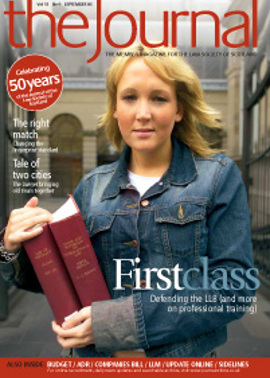A new print job

In April 2006, Cathy Jamieson, the Minister for Justice, launched the Scottish Fingerprint Service Action Plan for Excellence, which lists 25 action points to deliver a world-class fingerprint service to the criminal justice community in Scotland.
Amongst the 25 points is a recommendation for the Scottish Fingerprint Service (SFS) to bring forward the introduction of what is known as the non-numeric standard of presenting fingerprint evidence in court, thus meeting a longstanding commitment to do so.
The non-numeric fingerprint standard itself is not new, having been developed over a considerable number of years prior to its successful introduction in England and Wales in 2001. Despite agreement in principle to adopt the non-numeric standard in Scotland also, a decision was taken not to do so until the fundamental measures, which underpin the standard, had been addressed fully. These included the training, certification and competency testing of fingerprint experts and the establishment of robust quality assurance regimes, as well as a need for stakeholder consultation.
Turbulent times
It is important to place development of the non-numeric standard within the context of what else was happening in Scotland at that time. The Shirley McKie case resulted in a lengthy period of turbulence within the Scottish fingerprint community, bringing unparalleled scrutiny of the fingerprint service in general, with particular emphasis on organisational structures, governance and leadership as well as actual processes. This resulted in many changes and improvements, the key being the formation in 2001 of the Scottish Fingerprint Service, based operationally across four bureaux.
The McKie case was neither a direct driver nor a barrier towards the implementation of the non-numeric standard. It is, however, acknowledged that the programme of continuous improvement brought about as a result of the case did directly impinge on, and influence delivery of, the quality and training measures deemed necessary to implement the new standard.
The SFS must now move forward, taking cognisance of the lessons learned. To this end the principal purpose behind the Action Plan for Excellence is to take stock of the positive progress the SFS has made and consider what further action is needed to ensure its seamless integration with a new Scottish Forensic Science Service from 1 April 2007. This change in turn forms part of wider governance arrangements exercised through the formation of the Scottish Police Services Authority (SPSA), introduced by the Police, Public Order and Criminal Justice (Scotland) Act 2006.
By now moving forward to meet its firm commitment to adopt the non-numeric standard, the SFS continues in its determination to identify and implement best practice, both nationally and internationally, with a view to ensuring the highest possible public confidence in the system of fingerprint identification.
What is the non-numeric standard?
It is difficult to explain how the non-numeric standard came about, without first looking at the previous standard, based on the requirement to show a minimum of 16 points of agreement.
Fingerprints are unique to every individual and have been used as a means of identification for over a century. Fingerprint identification is based on scientific principles applied by trained and experienced experts. In presenting evidence to the court, the fingerprint expert is regarded as an expert witness. In 1953, the Home Office sought to establish a common standard for the presentation of court evidence in England and Wales, requiring fingerprint experts to demonstrate a minimum of 16 points of agreement between any two prints (with no points of disagreement). This standard was also adopted in Scotland.
This strict standard was later amended to allow an identification to be presented in court showing fewer than 16 points, but only in serious cases where fingerprint evidence was deemed to be crucial, the so-called “dire and crucial” criteria.
Since then, the numeric standard has been the subject of review and comment by a number of respected national and international bodies. These studies broadly conclude that there was no scientific or logical basis for the requirement to demonstrate 16 points. They also show that the majority of other countries working to a numeric standard apply a lesser figure, and that a higher rate of quality identifications is more likely to result from a system in which quality management is well established, with no requirement for a standard based on a minimum number of points.
Following further work this led, in 2001, to the adoption of a non-numeric standard in England and Wales, where it was well received. Effectively, it allows the fingerprint expert to adopt a more holistic and qualitative approach to each identification, and permits the court to consider that evidence, no matter the number of points of agreement. It is then up to the court to consider the value of the evidence in deciding the guilt or otherwise of the accused.
Why did Scotland wait?
As mentioned previously, it was decided that Scotland would not adopt the non-numeric standard at the same time as our counterparts in England and Wales, but would wait until the organisation was able to satisfy fully a number of criteria considered vital in respect of the more qualitative based system.
Since its formation, the SFS has been undergoing a period of continuous improvement focusing on processes and procedures, training and quality management systems. The key elements contributing to the implementation of the non-numeric standard have now been put in place and include:
Quality assurance - since 2001 all four bureaux in the SFS have held ISO 9001 accreditation, ensuring internationally recognised standards and regular external audit of procedures. The Service achieved single overall ISO 9001 accreditation in August 2005.
Training – SFS training programmes and peer review processes are deemed to be examples of best practice within the fingerprint profession. In addition, a comprehensive training programme, including court skills training, has been undertaken to ensure that all SFS staff receive sufficient training specifically on the implications of presenting evidence under the new standard.
Testing – all fingerprint experts are now subject to annual external competency testing and continuous professional development. Furthermore, all fingerprint experts are encouraged and supported to obtain membership with the Council for the Registration of Forensic Practitioners, the profession’s independent regulatory body.It has also been necessary to consult widely with key stakeholders including the Scottish Executive, the Association of Chief Police Officers in Scotland (ACPOS) and the Crown Office and Procurator Fiscal Service (COPFS) regarding the change, and their endorsement has been received.
Having achieved all of these elements, the SFS is satisfied that it is ready to adopt the non-numeric standard from 4 September 2006.
Key benefits of the standard
There are many benefits arising from the introduction of the non-numeric standard. Principal among them are the following:
The non-numeric standard allows evidence to be presented to the court on every occasion where an identity is established
All fingerprint experts undertake the same methodology when carrying out an examination. This will not alter as a result of the change to a non-numeric standard, but the expert witness will be able to discuss the process in more detail, rather than focusing on a prescribed number of points in agreement
The fingerprint expert can offer a much fuller explanation of how they arrived at their conclusion and this should be more easily understood by the court and, where appropriate, the jury
The court is able to assess all of the information presented to it and make an informed decision on the identification
All fingerprint evidence will be presented across Scotland in a clear and consistent style of joint report which has been agreed with COPFS.
Together with the planned future organisational changes, the introduction of the non-numeric standard as part of the Scottish Fingerprint Service Action Plan for Excellence therefore demonstrates a continuing commitment to improvement and to ensuring the highest professional standards with regard to the presentation of fingerprint evidence.
The changes in context
These changes are not taking place in isolation and are set against a landscape of the Scottish Executive’s agenda for improvement across the entire criminal justice arena. Criminal procedure is evolving, first through Bonomy in relation to solemn cases and now McInnes for summary proceedings. There is an increased focus on streamlining pre-trial arrangements, making it necessary for both prosecution and defence to be prepared fully for trial.
In relation to the way in which fingerprint evidence will now be presented under the non-numeric standard, it is anticipated that there will be a greater opportunity for both the Crown and defence agents to speak to and ask questions of the fingerprint experts, in preparation for trial, thereby ensuring clarity and increasing the opportunity for agreement of evidence. The SFS will actively encourage this contact as part of a culture of openness, accessibility and transparency.
Can I find out more?
A substantial amount of work has already taken place to inform the wider criminal justice community about the change. A leaflet and a CD-ROM have been commissioned, explaining what the non-numeric standard means in practice, its benefits and providing a fuller description of how a fingerprint expert makes an identification. Copies will be made available to key stakeholders and access may also be gained to the information via the SFS website at www.sfs.police.uk .
Deputy Chief Constable David Mulhern LLB, MA is Interim Chief Executive, Scottish Police Services Authoritys
In this issue
- Sincere thanks are due
- From the grass roots
- Training solicitors and teaching law
- Survival of the fittest?
- A new print job
- Plenty more besides
- That's settled, then
- East meets west
- A shot in the arm
- Tapping into CPD Online
- Master trainee
- Glitch hunt, not witch hunt
- A caveat on witnesses
- Victories for tenants?
- On your marks...
- Big bill for business
- Ripple effect
- How fair is fair?
- Scottish Solicitors' Discipline Tribunal
- Website reviews
- Book reviews
- Spinning plates
- Sending the right signals






